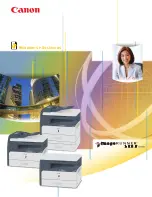
84
4 Paper
4.
Adjust the paper guides to the size of the
paper.
Important
• Make sure that the guides are positioned just lightly
against the paper. The guides that are too tight or too
loose can cause paper jams.
Note
• Do not fill paper above the maximum fill-line. Doing so
can cause paper jams.
Note
• When printing from the bypass tray, set the size and type of the paper on your print driver. For more
information, refer to the online help provided for the print driver.
• When [Bypass Mode] is set to [Panel Specified] (default: [DriverSpecified]) on the control panel, or when
[Paper Size] is set to an option other than [Driver] (default), set the size and type of the paper loaded in
the bypass tray before requesting a print job.
The printer prints your job only when the settings on your print driver match the settings on the control
panel. For more information, refer to " [Bypass Mode]" (P. 125).
Feed Orientations for Envelopes in the Bypass Tray
When loading envelopes in the bypass tray, be sure to load them in the correct orientations.
Important
• For best print quality, do not use envelopes that:
• are curled or twisted.
• are stuck together or damaged.
• have windows, holes, perforations, cutouts, or embossments.
• use tie strings, metal claps, or metal folding bars.
• have postage stamps attached.
• have any exposed adhesive when the flaps are in the sealed position.
• have deckle edges or creased corners.
• have rough, cockled, or laid finishes.
Envelopes with Adhesive Flaps
Envelopes with Non-adhesive Flaps
Example) Youkei 4
Example) Choukei 3
Load envelopes with the address side
facing down and the edge with the
flaps on your right. Make sure that the
flaps are closed.
Load envelopes with the address side
facing down and the edge with the
flaps on your right. Make sure that the
flaps are opened.
















































